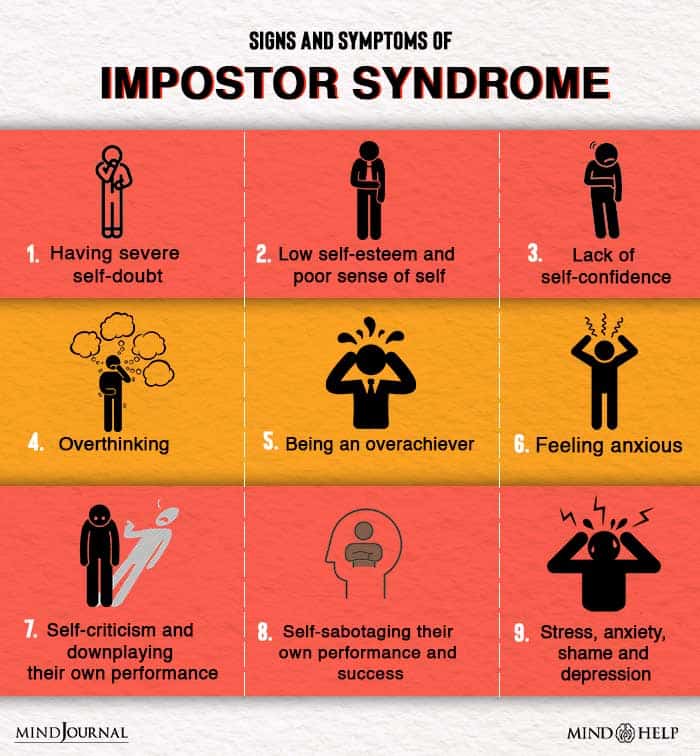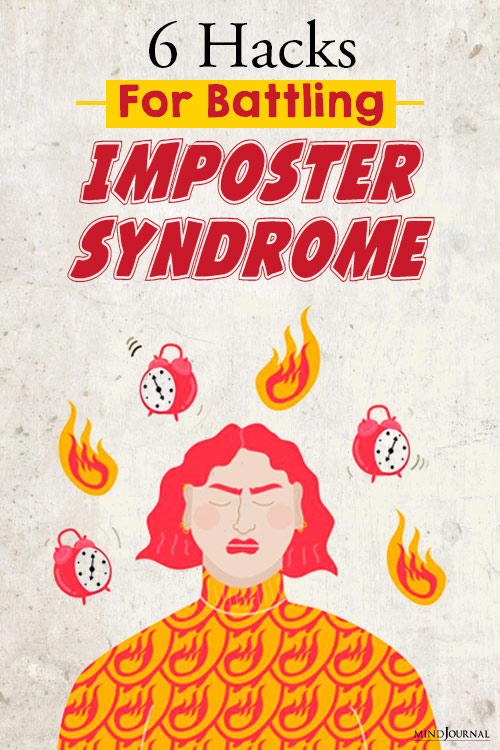“I still have a little impostor syndrome… It doesn’t go away, that feeling that you shouldn’t take me that seriously. What do I know? I share that with you because we all have doubts in our abilities, about our power and what that power is.” – Michelle Obama4g
Key Points: Imposter syndrome is a mindset that develops from deep-rooted insecurities. Altering our mindset, redefining success, and changing how we talk about ourselves can help combat imposter syndrome. Imposter syndrome can lead to self-sabotage and perpetuate anxiety because of the strong need to be validated by others.
Imposter syndrome is another buzzword that has been circulating on social media and in conversation, especially over the past few years. Simply put, imposter syndrome is the antagonizing thought or fear that you are not capable, worthy, or “good” enough to fulfill a certain role or be included in a particular group.
It is not classified as a psychological disorder, but rather a mindset that develops from deep-rooted insecurities. It can lead to self-sabotage and perpetuate anxiety because of the strong need to be validated by others. Thought processes and behaviors associated with imposter syndrome were once thought to predominantly affect women, but they can affect anyone, particularly during major transitions in life when unpredictability is high.
Thought patterns associated with imposter syndrome include:
- People can see through me.
- I’m a fraud.
- What makes me think I am qualified for this role?
- I don’t know how to complete this process from start to finish so I shouldn’t even start.
- Everyone has more experience than me.
- I am not worthy.
- Why did I originally think I could do this?
- I need someone else to encourage me or structure me.
- I should just wait until I feel more confident and capable.
Related: 5 Signs You Are Self-Sabotaging Your Prosperity
One’s personality type and upbringing can greatly affect the likelihood of developing the thought patterns associated with imposter syndrome. For example, if you were raised in an environment that predominantly celebrated achievements and associated self-worth with winning or progressing to the next level, you will more than likely be drawn to this type of structure as you age.
The issue for most though, is that this concrete structure tends to fade as we enter into adulthood. Many individuals who were raised in an environment that followed the traditional path of academia, experience a quarter-life crisis in their early 20s.
Friendships change, academic frameworks are gone, grades are not given, extracurriculars and athletic teams are not easily accessible. We are challenged to create our own structure and integrate it into new activities in order to feel connected and validated.
Our society tends to value and glorify concrete, visible achievements that embody some version of competition, like one’s job title or material possessions. Let’s not discount the incredible amount of effort it takes to nurture relationships, maintain mental and physical health, and cultivate a lifestyle that is balanced and fulfilling.
These individualized efforts are so impressive, simply because they require a steady dose of internal validation and consistency. These commitments will typically not result in a pay raise or an award, the motivation is fueled internally and by the desire to positively impact the lives of those you are most connected to.

Rewire Your Thinking
1. When someone acknowledges you or gives you a compliment, simply reply with a “thank you.” Refrain from answering with “thanks, but it was just luck” or in a way that degrades you and your efforts. This may feel awkward at first, but it will get easier and you will begin to break the habit of downplaying your efforts and achievements.
2. Be mindful of how and why you are sharing information about yourself. Avoid statements that slyly reel someone in and encourage her to say something that will boost your ego. This tactic will probably result in a compliment, but the feeling that it generates is fleeting and in reality, does not fill the internal void.
This void will only begin to fill when you commit to believing in yourself and adopting a lifestyle that embraces the idea that success is a process that requires embracing risk and creating reasonable expectations.
Related: 12 Things You Can Do To Build Your Self-Esteem: A Step-By-Step Guide
3. Friendly competition can be incredibly empowering and motivating, but operating mainly through a competitive lens creates an intense amount of pressure and can lead to feelings of inferiority. Surround yourself with people who seek to collaborate and celebrate the growth associated with wins and setbacks.
4. Practice sharing statements that begin with, “I am proud of my efforts in…” or “It has been really satisfying to…” This framework encourages internal validation and omits the need, desire, or reliance for someone else to praise or affirm you. It is not categorized as bragging and prevents you from degrading someone else in order to feel validated.
5. Avoid comparing yourself to others. Now more than ever we are exposed to snapshots of others’ lives. We can easily fall victim to the “grass is greener” trap. Remove the idea that success is concrete or that it has a clear-cut finish line.
The achievements of others are simply that, the experiences that someone else can claim as part of their journey. They are not threats and should not be viewed as a means to derail you. There is plenty of space for all of us.
6. Start by redefining what the word success means to you. Think of it as a process rather than a defining moment or achievement. Success is a journey, one that requires vulnerability and deliberation. It embodies the desire to keep pushing forward as you validate your efforts.
As humans, we are designed to feel an array of feelings and generate extensive thought patterns. It is these abilities that enable us to discover and embrace what works best for us as we progress through life.
Related: How To Get Motivated To Do Anything? 4 Word Formula
The next time you are asked about your greatest success, try replying with a statement that omits the pressure or concrete measurements often associated with success. Perhaps you answer the question like this, “I’m still on my journey. I am proud of my achievements along the way, but it’s the setbacks that have really encouraged the most growth.”
Enjoy the process and don’t forget to take up space.
I facilitate 6-week virtual female empowerment groups and will be launching another one in Jan. We will discuss topics such as: Resilience, Imposter Syndrome, Managing Stress and Anxiety, Maintaining Personal/Professional Boundaries, Giving and Receiving Feedback, and Preventing Burnout.
I am a mental wellness consultant and work with companies/organizations to create a culture that supports mental health and increasing productivity and connections within the organization. I have several different packages and am also willing to conduct one-off trainings or Q&As on a variety of topics around managing anxiety, preventing burnout, effective communication, and building resilience.
Written By Leah Marone Originally Published On Psychology Today









Leave a Reply
You must be logged in to post a comment.